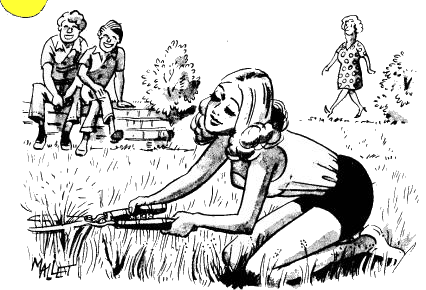 Mrs Jones did not have a husband, but she had two sons. They were big, strong boys, but they were lazy. On Saturdays they did not go to school, and then their mother always said, “Please cut the grass in the garden this afternoon, boys.” The boys did not like it, but they always did it.
Mrs Jones did not have a husband, but she had two sons. They were big, strong boys, but they were lazy. On Saturdays they did not go to school, and then their mother always said, “Please cut the grass in the garden this afternoon, boys.” The boys did not like it, but they always did it.
Then somebody gave one of the boys a magazine, and he saw a picture of a beautiful lawn-mower in it. There was a seat on it, and there was a woman on the seat.
The boy took the picture to his mother and brother and said to them, “Look, that woman's sitting on the lawn-mower and driving it and cutting the grass. We want one of those.”
“One of those lawn-mowers?” his mother asked.
“No,” the boy said. 'We want one of those women. Then she can cut the grass every week.”
A) Which of these sentences are true (T) and which are false (F)? Write T or F .
l. Mrs Jones had three sons;
2. They were big and strong but lazy.
3. The boys did not like cutting the grass.
4. The boys did not always cut the grass.
5. Someone gave one of the boys a lawn-mower.
6. A woman cuts the grass every week.
B) Answer these questions.
l. What did Mrs Jones say to her sons on Saturdays?
2. Why did they not like that work?
3. What did one of the boys see in a magazine?
4. What was there on the lawn-mower?
5. What did the boy say to his mother and brother?
6. What did his mother say?
7. And what did the boy answer?
C) Put one word in each empty place.
l. The boys were Mrs Jones's sons: she was their. . . .
2. One boy was the other boy's. . . .
3. The boys were lazy: they did not like . . . .
4. A lawn-mower cuts. . . . in gardens.
5. “The lawn-mower in the magazine was beautiful!” “Yes, it was very. . . .”

Mrs Jones
- Details
- Hits: 12539
